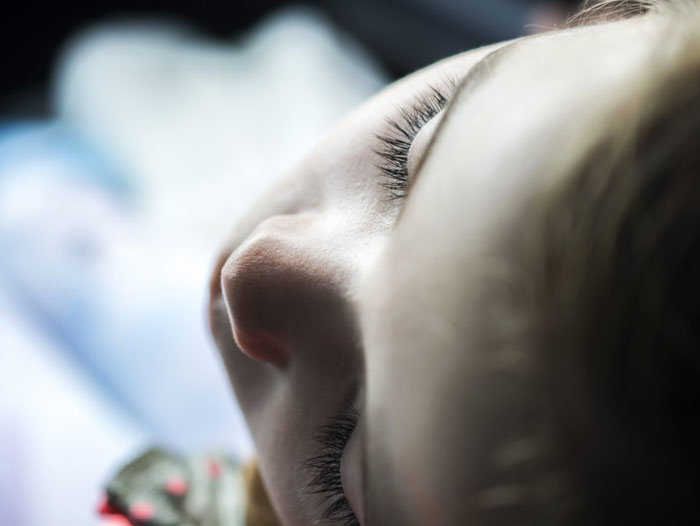How to Help Your Kid If She Has Nightmares?
There are many kids suffering from bad dreams and other dark world scares. Oftentimes they start even before the child reaches school age, and continues well into adolescence. There is nothing unusual about that, since normal infant development also implies the growth of understanding that around are things dangerous and able to cause pain.
 Things are worse if bad dreams and fears spring up as an outcome of a terrifying event like witnessing a road accident or being frightened by an animal; but it doesn’t seem to be always the matter, sometimes they appear mysteriously out of nowhere. They may be caused or aggravated by tension and nervousness of a parent or by rows in the family. Whatever it is that stirs up a kid’s emotions also serves to enhance their fears and anxiety.
Things are worse if bad dreams and fears spring up as an outcome of a terrifying event like witnessing a road accident or being frightened by an animal; but it doesn’t seem to be always the matter, sometimes they appear mysteriously out of nowhere. They may be caused or aggravated by tension and nervousness of a parent or by rows in the family. Whatever it is that stirs up a kid’s emotions also serves to enhance their fears and anxiety.
As children grow, their fears change with the age: younger ones tend to be afraid of monsters or cartoon villains, later on their fears become more realistic, embodying into criminals or disasters they may have seen on TV.
Parents should be aware that fear of nightmares can be used as an excuse to delay bedtime by some kids, and that should be recognized as a thing apart, while many pre-teens and teenagers really have worries and issues that make them anxious and bring on sleep disorders.
While nightmares cannot be 100% eliminated, there are measures ensuring more peace during the night. Provided they’re taken, a child troubled by a nightmare can be calmed down more quickly and easily.
When can a nightmare assault?
Similar to good dreams, nightmares come when the brain is most active and can produce images and scenes so vivid as to cause the rise of strong reactive emotions.
This stage is called the rapid eye movement period (REM) due to the movement of the eyes under the eyelids during sleep. These periods grow longer as the night progresses, consequently, nightmares are more likely to occur far into the night.
As children come awake, the nightmare images that scared them remain almost as vivid and can be taken for real ones – so children don’t slip out of their fear and need to be comforted.
When children reach preschool age it begins to dawn on them that they get scared by a dream and none of what they see really happens. Still, they can’t stop getting frightened, and may be troubled by nightmares for some time to come.
Whence do nightmares arise?
There’s no certain knowledge as to how nightmares come on their nightly visits. It seems that they (as well as dreams) help children with arranging and sorting out their feelings stimulated by the day’s happenings. It may even be that a nightmare contains scenes and events that can be easily referred to the day – but they are often twisted out of the proportion, depending on what details and images the kid remembered best.
Stimulating pleasant dreams
Nightmares can’t be prevented, yet parents can try and create an atmosphere that will go for encouraging pleasant dreams. As the bedtime draws near, take measures to have your little one laid-back and content.
What can you do?
First, ensure regular go-to-bed and time-to-wake time.
As the kid prepares for bed, do things to make them feel slowed down, safe and comfortably tucked into bed. Make them take a relaxing bath, hug them and stay to discuss some recent pleasant happenings, read a carefully chosen book.
The bed should be an inviting, peaceful spot where the child is calm and happy with a stuffed toy around and things that make the place cozier, like a soft-light lamp or a dream catcher.
See that before going to bed the child doesn’t watch TV shows and movies that could contain violent scenes or other episodes that could generate scary images.
Remind the kid that nightmares are just dreams that won’t really hurt him or her.
If a nightmare occurred
You should be aware how you can behave to mitigate the post-effects of a bad dream:
Let your presence have a quietening effect – remind the little one you are around and that nothing bad is going to happen to them. They are safe and sound and you are watching over them so that they will come to no harm.
Give a name to their bad dream – tell the kid that he had a nightmare, but it’s gone. Find words to get it across to the youngster that he is already wakened and is in the real world where the phantoms don’t exist. There is no danger, nor was there any.
Provide the lighting. If your little one is quite happy to go to sleep with a night-light on, it may be of help. When they wake up, the light can make the dream go away more quickly. Likewise, if you think that the child may have a nightmare, don’t close the door of the child’s room so that they won’t feel penned in when they awake from a nightmare.
Provide empathy. Tell the youngster that it’s quite right for them to feel scared if they saw a dream that really frightened them. Some dreams do seem real enough, and all people are apt to be influenced by nightmares and wake up screaming.
Now help the kid fall asleep again by providing further comfort. Try to bring their mood round to a more comfortable one and conducive to falling asleep again: encourage them to hug a stuffed toy, play relaxing music, arrange the pillow and the blanket for more comfort. Talk to the kid about topics likely to dissolve any troubled atmosphere. Before leaving, plant a kiss on the child’s brow or on the palm to let them hold on to it.
Get ready to listen: actually you don’t need to discuss nightmares at length during the small hours of the morning. Chances are your kid wants to talk to you unburdening themselves and relating their experience either straightaway or on the following morning. Always give them the chance to do so; encourage them to draw or write out their nightmare because in the daytime the fear is apt to fade. Better yet if you can get them to think up a happy ending to whatever they remember they saw in a dream.
Become a magician. If you know that your child is imaginative and easily bent to suggestion, work on it. Will away, spell away or spray away imaginary monsters pretending you can make them disappear by magic powers. Encourage your little one to check the dark nooks of the room to ensure there is no scary beast hiding there. Let them make sure the coast is clear.
Special encouragement. There are children who score points for themselves whenever they draw extra attention to themselves for getting scared. Once you begin to feel this is what is going on, you want to amend the pattern. Insist that you are proud of the youngster for displaying bravery before illusory danger. Give them stars for getting over the fear and being able to sleep without disturbance. When they have earned so much of bravery stars they get a special treat of the kind they have a predilection for.
In most cases bad dreams trouble the young but occasionally; a little parental attention and reassurance can go a long way and provide the child with whatever comfort they need. As soon as you feel that nightmares occur too often for the youngster’s peace of mind, disturb his or her sleep regularly, or correlate with other behavioral issues, consider consulting the family physician.




